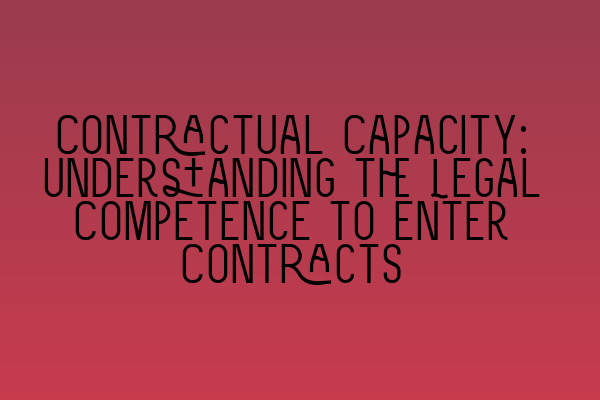Contractual capacity is a pivotal concept in contract law. It refers to the legal competence of parties to enter into a contract. Understanding contractual capacity is crucial for both solicitors and individuals involved in contractual relationships, as it determines the enforceability and validity of agreements. In this article, we will delve into the intricacies of contractual capacity and explore its significance in contract law.
What is contractual capacity?
Contractual capacity is the mental and legal ability of individuals to understand the nature and consequences of a contract and make a binding agreement. Not everyone has the same level of contractual capacity, and it varies depending on various factors, including age, mental competency, and intoxication.
In general, a person with full contractual capacity has the legal right to enter into any type of contract and can be held responsible for fulfilling their contractual obligations. On the other hand, those lacking contractual capacity may need the assistance of a legal guardian or may not be able to enter into enforceable contracts at all.
Age and contractual capacity
One of the fundamental factors affecting contractual capacity is age. Generally, individuals under the age of 18 (known as minors) are presumed to lack the capacity to enter into enforceable contracts. This presumption is based on the idea that minors may not possess the necessary judgment and maturity to fully understand the consequences of their contractual actions.
However, there are exceptions to this rule. For example, contracts for necessities, such as food, clothing, and shelter, are often enforceable against minors. This is because these contracts are deemed to be in the minor’s best interest and essential for their well-being. Additionally, contracts entered into by minors for educational purposes or employment may also be enforceable.
It is essential for solicitors and individuals to be aware of the legal framework surrounding contractual capacity for minors. By understanding the exceptions and limitations, they can navigate the legal landscape and ensure that their contracts are valid and enforceable.
Mental competency and contractual capacity
Another crucial aspect of contractual capacity is mental competency. Individuals with mental impairments or disabilities may lack the ability to understand and make rational decisions regarding contracts. In such cases, their contractual capacity may be called into question.
The law recognizes that individuals with mental impairments should be protected and not subjected to unfair contractual obligations. However, the determination of mental competency can be complex and often requires expert assessment.
If a solicitor suspects that a client may lack mental competency, it is crucial to seek guidance from relevant experts and follow appropriate legal procedures. By doing so, solicitors can help ensure that their clients’ interests are protected and uphold the principles of fairness and justice.
Intoxication and contractual capacity
Intoxication is another factor that may impair an individual’s contractual capacity. When a person is intoxicated due to alcohol, drugs, or other substances, their ability to understand the terms of a contract and make informed decisions may be compromised.
In contract law, intoxicated individuals may lack the capacity to enter into valid agreements. However, there are exceptions depending on the circumstances. For instance, if the other party was aware of the intoxication and took advantage of it, the contract may be deemed unenforceable.
Solicitors and individuals involved in contractual relationships should exercise caution when dealing with intoxicated individuals. It is essential to assess their capacity to understand the terms and consequences of the contract and ensure that their rights are protected.
The importance of understanding contractual capacity
Understanding contractual capacity is paramount for both solicitors and individuals involved in contractual relationships. Failing to consider contractual capacity can result in unenforceable agreements, disputes, and potential legal consequences.
For solicitors, knowledge about contractual capacity allows them to provide accurate legal advice and ensure that their clients’ contracts are legally binding. It helps them navigate the exceptions and limitations, assess the capacity of their clients, and protect their clients’ interests.
For individuals, understanding contractual capacity empowers them to make informed decisions and enter into agreements with confidence. It allows them to assess their own capacity and seek appropriate assistance or guidance when needed. By doing so, individuals can avoid entering into contracts that may not be enforceable or may cause legal difficulties down the line.
Conclusion
Contractual capacity plays a crucial role in contract law, determining the legal competence of individuals to enter into agreements. Age, mental competency, and intoxication are key factors that affect contractual capacity. It is essential for solicitors and individuals to have a thorough understanding of these factors to ensure the validity and enforceability of contracts.
By staying informed about contractual capacity, solicitors can provide effective legal representation and protect their clients’ interests. Individuals can make informed decisions, avoid potential legal pitfalls, and enter into enforceable contracts with confidence. In the complex world of contract law, understanding contractual capacity is a vital skill for all parties involved.
